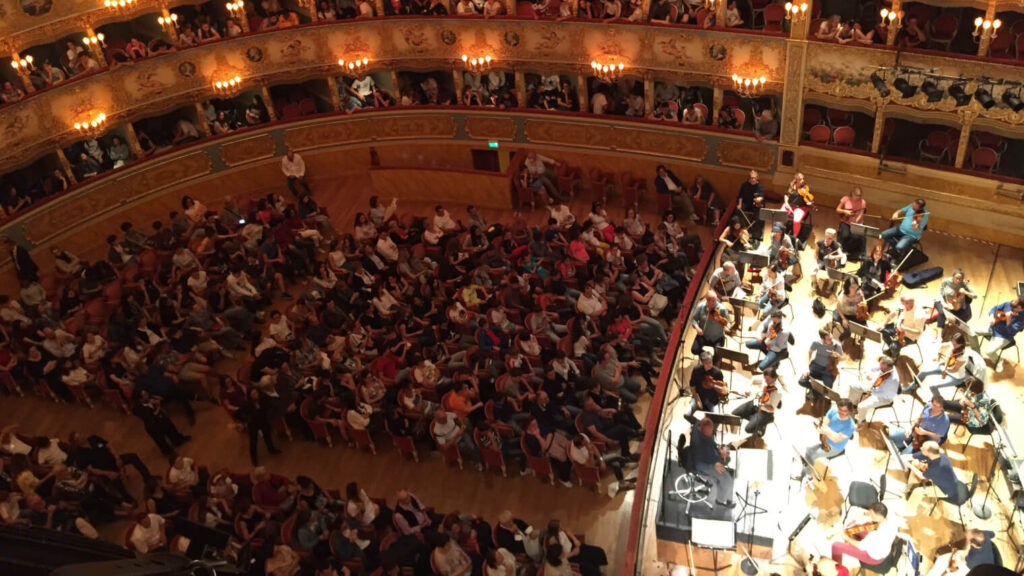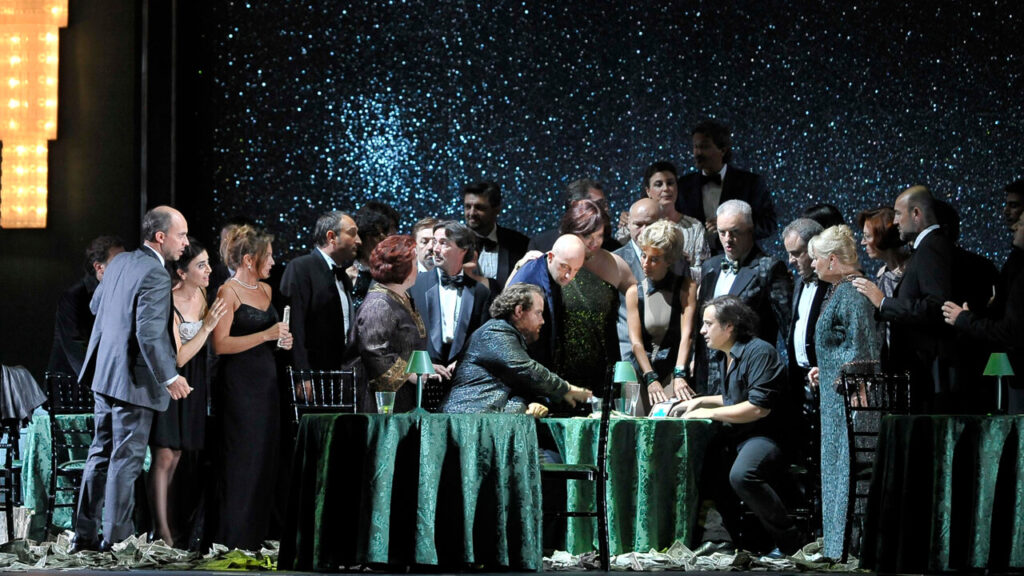

A theater that during the pandemic has been able to transform its offer without distorting itself, confirming itself as an Italian and international reference point for the dissemination of the lyrical and symphonic heritage. Verdi, Wagner and the great conductors for a new season as absolute protagonists.
To illustrate the upcoming season at Venice’s main opera theatre – the Fenice – There’s no better voice than Fortunato Ortombina’s. Ortombina is the theatre’s superintendent and art director, and a passionate professional. We will get to know more about a historical theatre that never stopped working, even during the pandemic, offering Venice and the world page after page of immortal music. Its audience never lacked in support and presence, either.
The Fenice’s new season, opening on November 18 with the Falstaff
I want to start with data: the number of our season ticket holders is perfectly aligned with what used to be before the pandemic. In the last two years, we couldn’t make schedules longer than a month, for obvious reasons. There is much to be seen in the upcoming season: music from the seventeenth, eighteenth, nineteenth, twentieth centuries, and from today. As usual, there will be an opera and ballet programme and a symphony programme, though unlike earlier seasons, the two programmes will be roughly equivalent in number. The reason is, we want to reach out to the largest possible audience, hence we need a diverse offering and a reasonable number of productions. The times of 150 runs per year are over. What the Fenice needs to do is Being the Fenice, and honour the best of standards in production and quality. Also, what we do is a public service, which means we cannot disregard the preferences of our public. I strongly believe that the right way to do our job is to never ignore society. A round of applause tells so much, if you only are patient enough to observe. We owe our audiences our undivided attention.
For many visitors, going to the Fenice is above all an experience in itself. Our relationship with theatregoers does not limit to accompanying them to their seat after checking their ticket. Each of them gives us three hours of their life, and each has a different experience, a different feeling about it. Our job is to make all of them feel at home, feel like they’re in a place they would want to be.
A recognition of your merits, and the upcoming opera programme
Last July, I was made Commander of the Order of Merit of the Italian Republic, a recognition that I feel I should share with all workers at Fenice, especially the unseen workforce behind the scenes. Their contribution has been essential for the civil, cultural, and economic outreach of our seasonal programme. Now, speaking of programme, there will be a lot of Verdi in it. Our resident conductor, Maestro Chung, has been working extensively on Verdi over the last several years, and will present the Falstaff, Verdi’s last opera, on the season’s opening day, November 18. It had been years since the Falstaff had been performed at Fenice. The upcoming rendition will be directed by Adrian Noble, a longtime member of the Royal Shakespeare Company. Verdi was 80 when he presented the opera in Milan, a piece of comedy that taps from several different comedies by Shakespeare. The cast is quite young, on average, with forty-four-year-old Nicola Alaimo in the title role. Alaimo will bring freshness to the opera, and I think his talent in declamation is unrivalled.

The second title in our programme is a ballet piece, La dame aux camélias by Chopin, a production of the Hamburg Ballet, who will employ the choreography of their founder John Neumeier. It is fitting that we welcome this particular ballet, for it was the story of the dame that inspired the Traviata, which in turned premiered right here at the Fenice Theatre.
Next, there will be modern music. Bruno Maderna’s Satyricon is an outstanding piece. An introduction to the composer’s character, which I suggest looking into, is his interpretation of Mahler’s repertoire with the BBC orchestra – in my opinion, one of the highest moment in musical interpretation ever.
As we draw closer to the end of winter, Domenico Cimarosa’s The Secret Marriage will alternate with Rossini’s The Barber of Seville. Cimarosa (1749 – 1801) was born in Naples, though visited Venice both before and after his sojourn in Russia. In March, we will stage Verdi’s Ernani. What I meant earlier when I spoke of diversity in theatre programmes is that classics should always be there. The upcoming Ernani is our own production, which we will keep as close as possible to its first Fenice run in 1844, fourteen years after Victor Hugo’s prose version at the Comédie-Française in Paris. Being known as a revolutionary was not the way to go in Venice at the time, for the Venetian was under Austrian occupation and censorship was rampant. Surprisingly, though, Verdi’s opera, based on Hugo’s work, has been greenlighted. More, the scene set by Charlemagne’s tomb, with the famous verse “Let the lion awake in Castilia”, was allowed unchanged, which is all the more surprising given how the Lion is the symbol of Venice, too. There is no account of the Austrian authorities being present when it was sung – it would have accounted for shutting down the Fenice altogether – but we know that singing that verse to annoy the invader grew common in town.
Later in the spring, we shall have Gluck’s Orpheus and Eurydice, an icon of operatic history dedicated to one of the most ancient figures of cantors of all time. The orchestra will be conducted by Ottavio Dantone and the opera’s director will be Pier Luigi Pizzi. The ballet programme, in turn, will have a Swan Lake rendition by the Monte Carlo Ballet.
Another title that had never been performed here is Georg Friedrich Handel’s The Triumph of Time and Truth – it will be staged at the Malibran Theatre, conducted by Andrea Marcon, and directed by Saburo Teshigawara, who was awarded the Golden Lion at the last Dance Biennale. Handel got his musical education as a composer in part in Venice, and precisely, at the Malibran Theatre – or, at the time, the San Giovanni Grisostomo Theatre. His first commission was for an Agrippina, later performed in the same theatre.
The month of June 2023 will be dedicated to Wagner. It was about time to have him back, at least since our 2017 production of the Tannhäuser. Thanks to director Marci Lakomicki and conductor Markus Stenz, we will produce The Flying Dutchman. The next year, it will be Lohengrin’s turn. We believe firmly that each season at Fenice must include essential elements, with Wagner being one of them.
Mascagni comes next, with the Cavalleria Rusticana, a verist masterpiece that will be staged in late August and co-produced with the Venice Academy of Fine Arts. The staging is new and original thanks to director Italo Nunziata and musical direction by Donatto Renzetti.
Further on, we will work on Robert Carsen’s production of the Traviata together with the students of the Fine Arts Academy, four years after its earlier run. This will take us into the 2023-2024 season, when we will celebrate the twenty years since Fenice’s reopening after the 1996 fire.
More concerts at the Malibran Theatre: Vivaldi’s Orlando furioso conducted by Diego Fasolis. This is Malibran’s most successful production, proved also by the view count on our YouTube channel, totalling over 600,000. Closing the season, more Verdi, with I due Foscari to be staged in October 2023 by Fondazione Teatro del Maggio Musicale Fiorentino.
Completing the season are concerts of the Educational programme and other special events, like Acquaprofonda, a modern opera with original music by Giovanni Sollima on a libretto by Giancarlo De Cataldo, and chamber opera Bach Haus by Michele Dall’Ongaro, a co-production with the Benedetto Marcello Music Conservatory of Venice

On to symphony…
Our programme lists great homecoming events, like that of maestros Myung-Whun Chung and Charles Dutoit, who will bring to the Fenice his masterful interpretations of Ravel and Debussy. We will welcome Tom Koopman, too, with music by Bach and Mendelssohn, and pieces never played at Fenice before, like Fauré’s Requiem, which will be conducted by Jonathan Darlington in February 2023, or Gustav Holst’s The Planets op. 32, conducted by Dennis Russel Davies in October 2023.
On Good Friday next year, April 7, Maestro Chung will preside over a Mozart performance, while in May, we will have Robert Trevino and his classics programme with Beethoven and Strauss. The latter concert will have the usual double night programme, plus a third one, dedicated to an audience strictly under 35, at a reduced price of only ten euro. Young audiences exist, and I prefer not to call them ‘the audience of tomorrow’ – they are the audience of today, and we must address their preferences. They want to go to theatre, and we must support this social, as well as cultural, urgency.
The Fenice beyond Venice
We will most likely participate in the 2023 Italian Cultural Capital programme in Bergamo and Brescia and we will take the Ernani to the Budapest Festival. We will also produce shows in the Metro Venice area – over the last three years, there have been over 300. We work with schools, too, whose classes may watch dress rehearsals together with their teachers and our educators. There’s a programme for younger children every Saturday and Sunday, where they are encouraged to touch and play with musical instruments and familiarize with the characters of famous operas. We are the theatre of Venice, and we take pride in this role. We love our international and local audiences and work every day on being the place where a show that last a few hours can turn into memories that last a lifetime.